Hobart Papers
1 primary work
Book 116
Competition and Choice in the Publishing Industry
by Walter Allan and Peter J Curwen
Published 1 May 1991
The Net Book Agreement dates back to 1957 and was examined in the Restrictive Practices Court in 1962. The Judgement was favourable on the grounds the abolition would reduce the number of stockholding bookshops and the size of their stocks, cause book prices to rise and the number of titles published to fall. None of these arguments has withstood the test of time. The introduction of 'sale or return' conditions by publishers has reduced the risk of over-stocking by bookshops, thus enabling them, in the absence of the NBA, to introduce the practice open to other members of the retail trade of opting for a low price-high volume strategy. The authors of this Hobart Paper examine the defences of the Net Book Agreement both analytically and empirically and conclude that, whatever merit they may have had when accepted by the Restrictive Practices Court in 1962, they can no longer be maintained. Publishers therefore, operate what amounts to a cartel since book prices are geared to the 'going rate' for a mass market paperback or academic text. There is no longer a sound economic argument in favour of retaining the Net Book Agreement.
